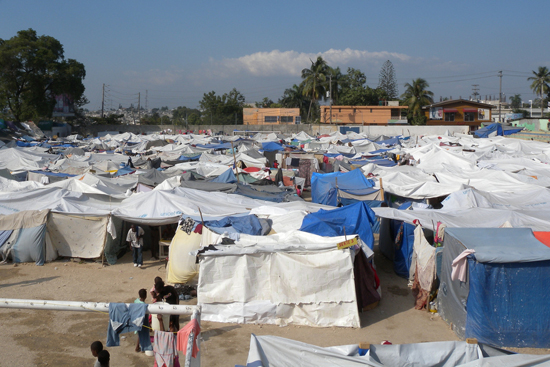Healing, and Reporting, When Disaster Strikes
BU conference to explore how responders, reporters can collaborate

As Japan struggles to contain its nuclear crisis, and a year after the disastrous BP oil spill in the Gulf of Mexico, an international conference at BU tomorrow explores the double helix of reporters and humanitarian responders and how they might better work together.
Keynoting When Disaster Strikes: Reporting and Responding is reporter Kerry Sanders, NBC’s Miami-based correspondent since 1996, who has covered numerous hurricanes, the Iraq war, and Middle East terrorism, and NBC News producer Jane Derenowski, another veteran of disaster coverage. Sanders received an Emmy Award, a George Foster Peabody Award, and an Edward R. Murrow Award for his coverage of Hurricane Katrina. The daylong conference, being held at the BU Photonics Center, is open to the public.
Other speakers, hailing from BU and beyond, include Enrique Silva, a Metropolitan College assistant professor of urban affairs and city planning, who made several trips to Haiti to advise the Haitian government after the January 2010 earthquake that killed 300,000; USA Today reporter Donna Leinwand, who has covered stories ranging from Japan’s recent earthquake and tsunami to the shooting of Congresswoman Gabrielle Giffords; and Bill Wheeler of the nonprofit Pulitzer Center on Crisis Reporting, in Washington, D.C., which is cosponsoring the conference with the College of Communication, the School of Public Health, and the BU Center for Global Health & Development (CGHD). They will be joined by global health experts, representatives from NGOs, and volunteers who have participated in disaster relief.
COM lecturer and veteran Boston television news anchor R. D. Sahl, who will give the welcoming and concluding addresses and introduce the keynoters, explains why the conference is necessary: “Health care professionals and other aid workers need journalists to convey the dimensions of disaster to every corner of the globe. Journalists rely on public health specialists to provide information, context, and real-life narratives to make a crisis come alive. Too often, these groups collide.”
Sahl will also moderate a discussion with College of Arts & Sciences astronomer Michael Mendillo, who survived last month’s Japanese earthquake and tsunami.
Conference panels will probe how decisions to coordinate both news coverage and medical care are made in the immediate hours after a catastrophe; on-the-ground lessons from disasters about improving the medical response; and what happens in a disaster’s aftermath, when weary journalists and news consumers might shift their attention elsewhere despite the prolonged consequences of a disaster.
For journalists, the nuts-and-bolts questions involve such things as discerning fact from fiction amid fluid, chaotic situations, says Elizabeth Mehren, a COM professor and one of the conference organizers. The former Los Angeles Times reporter cites as an example Ray Nagin, who as mayor of New Orleans during Hurricane Katrina gave out inaccurate information. One of the goals of the conference, Mehren says, is to teach interview techniques in a disaster, which are “different from what you do at a press conference at the governor’s office.” For example, in a room full of survivors, how do you decide whom to interview? (“It’s the one who makes eye contact,” Mehren offers.)
For SPH’s part, many students there are interested in global health journalism, says Jennifer Beard (SPH’06), an assistant professor of international health and a CGHD faculty member. The relationship between journalists and health workers in a crisis “has as much potential for mutual assistance as it does tension,” she says, “and we really wanted to tease out those details through the ways to work together more effectively.”
Besides the conference, Beard says, a practicum this year will pair a professional journalist in Washington, D.C., with either an SPH or a COM graduate student for a monthlong reporting assignment. The work will be based out of Pulitzer Center headquarters.
The conference, the first collaboration between the organizing institutions, could be the precursor to annual gatherings on the topic, Mehren says. Among other faculty organizers are Anne Donohue (COM’88), a COM associate professor, and Monica Onyango (SPH’99), an SPH clinical assistant professor.
When Disaster Strikes runs from 8:30 a.m. to 5 p.m. on Thursday, April 14, at the Photonics Center, 8 St. Mary’s St. The event is free and open to the public, but registration is required. Register here.
Rich Barlow can be reached at barlowr@bu.edu.

Comments & Discussion
Boston University moderates comments to facilitate an informed, substantive, civil conversation. Abusive, profane, self-promotional, misleading, incoherent or off-topic comments will be rejected. Moderators are staffed during regular business hours (EST) and can only accept comments written in English. Statistics or facts must include a citation or a link to the citation.